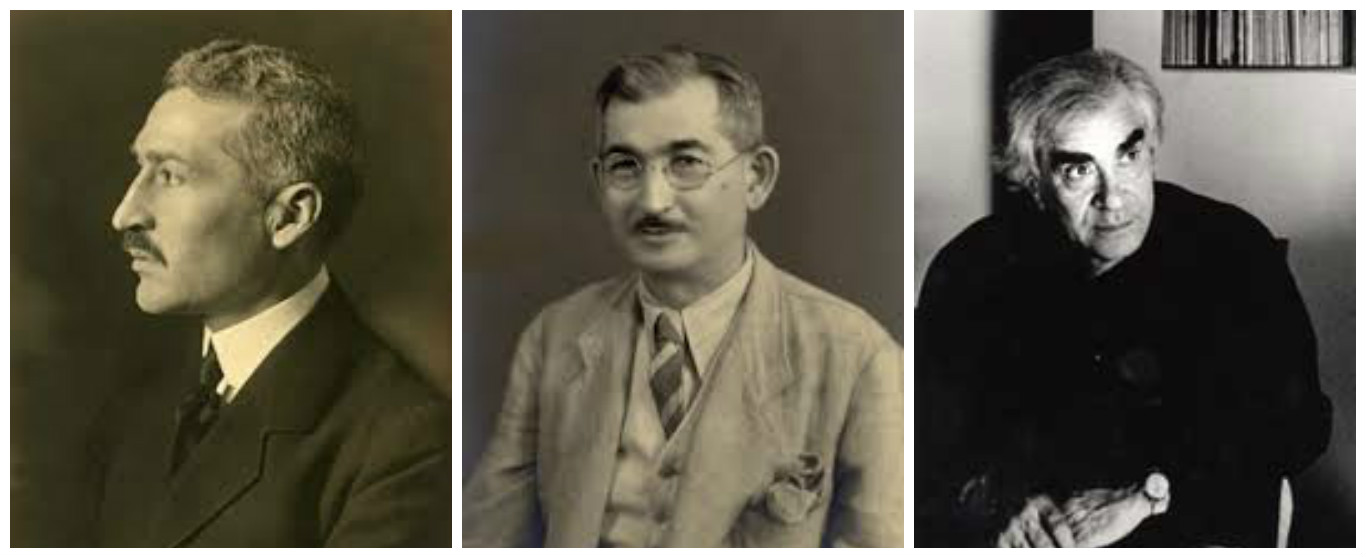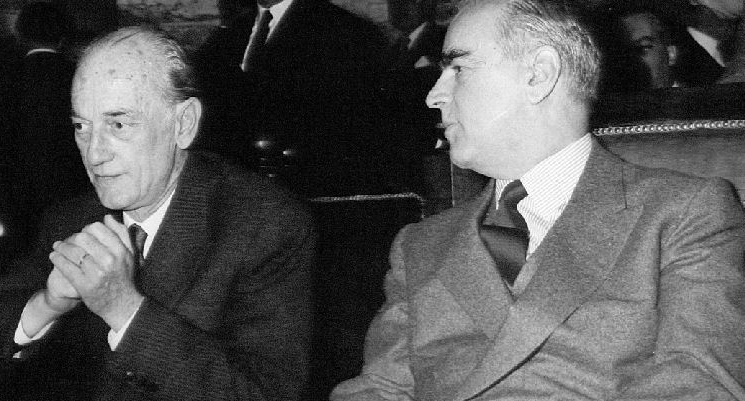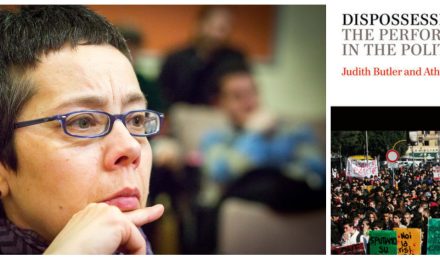Angelos Chryssogelos is president of the Hellenic Conservative Policy Institute – INSPOL (Ινστιτούτο Συντηρητικής Πολιτικής – ΙΝΣΠΟΛ). He is a research fellow at the Hellenic Observatory of the London School of Economics and an associate at the Europe Programme of Chatham House. He has studied in Greece and the Netherlands and holds a PhD in political sciences from the European University Institute in Florence.
Georgios Antoniadis is a managing partner of INSPOL. He holds a postgraduate degree in International Relations and Strategic Studies from Panteion University. He has worked for the Constantinos Karamanlis Institute for Democracy and the Center for Euro-Atlantic Studies and has published a series of articles for the websites of the above organizations as well as for the online magazine Antiphono.
INSPOL is a think tank that aims to promote conservative values, ideas and priorities in the public sphere and in policymaking. It publishes policy studies and current affairs commentaries, and organizes public events of various formats. In 2015 INSPOL’s first major study on Church-state relations in Greece was published by Manifesto publications. Recent events organized by INSPOL include a public debate on the refugee crisis and an open symposium on the thought of philosopher Panagiotis Kondylis (Athens, Arpil 2016).
Angelos Chryssogelos and Georgios Antoniadis spoke to Rethiniking Greece* about Greek cultural identity and tradition, the Greek Right’s ideologies and Greece’s “geocultural parameters”, Greek philosopher Panagiotis Kondylis’ various readings and his importance for conservatism, New Democracy‘s new leader Kyriakos Mitsotakis and his Europe vs. populism opposition stance, as well as anti-austerity and Eurosceptic agenda in Greece and Greece’s handling of the migration crisis and SYRIZA yielding to European demands. For Chryssogelos and Antoniadis “Greek political system is locked in an almost unconditional acceptance of decisions emanating from Europe” and “European integration has to be reconnected with national identities and cultures and to be portrayed as a complement and enhancement of national interests in order to survive.”
Is there a conservative political current in Greece? Are there any affinities with the European and Anglo-American conservatism?
GA: Conservatism in Greece today is not a well-defined political camp but a heterogeneous social current that resists the universalist tendencies of modernization. The point where conservatives, right-wing populists and even left-wing communitarians converge is their skepticism towards the federalist pretenses of the European project, as well as their reservations towards elitist top-down attempts at modernization that neglect fundamental conditions of Greek society and traditions. Conservatives are also interested in Greece’s byzantine and post-Ottoman legacy and the contradictions that the implementation of Western-inspired institutions, practices and ideas encounters in the Greek context.
Modern Greek conservatism (not unlike the much better known Modern Greek Enlightenment) has always been in constant dialogue with European currents, whether one thinks of the ethno-romantic influences on Konstantinos D. Karavidas and Ion Dragoumis or the existentialist analysis of Heidegger by Christos Yannaras. Lately there has even been a turn of a budding neoconservative camp in Greece towards republican and libertarian ideas that are particularly prevalent in the Anglo-Saxon world. It is doubtful however whether e.g. the social-communitarian legacies of Orthodoxy can be reconciled with reactionary and individualistic ideas at the core of the Anglo-Saxon New Right.
 The debate about “Greekness”, Greek cultural identity and tradition has been an underlying theme in the Greek political discourse from the days of Greek independence. What is the importance of this discussion under the current crisis circumstances? Is ideology an important issue for the Greek Right?
The debate about “Greekness”, Greek cultural identity and tradition has been an underlying theme in the Greek political discourse from the days of Greek independence. What is the importance of this discussion under the current crisis circumstances? Is ideology an important issue for the Greek Right?
The question of Greek exceptionalism and the historical continuity of Hellenism remains topical, particularly given the exhaustion of the European project since the end of the Cold War. On the one hand, defining ‘Greekness’ in a proactive, and not just defensive, way is crucial for our current self-awareness. It calls for us to understand the Greek nation today as something different from the sum of citizens or a disposable ‘people’ trapped in the inescapable course of globalization. This poses some very practical questions. For example, if we are simply nothing more than a body of voters (as some theories of citizenship postulate) what keeps us from granting full citizenship rights to all immigrants living on Greek soil? Conservatives have a qualitatively distinct understanding of what constitutes a political community, both conceptually and with regards to the Greek case in particular.
On the other hand, formulating effective geostrategic and geoeconomic policies with regards to Europe, Turkey, the Balkans etc. presupposes that we take into account geocultural parameters when we think about potentials of amity and confrontation within and beyond the Euro-atlantic area. For the Greek right ‘Greekness’ could be the main pillar of a national strategy that, without ignoring the geopolitical anchoring of Greece to the West, would lay the ground for a multifaceted and realist reading of opportunities and risks that appear in the political environment of the Eastern Mediterranean – from transnational terrorism to new migrant waves and Islamic radicalization. Again, this self-awareness of Greekness is of much more than theoretical value. To use a provocative example, if we were to see ourselves as nothing more than Greek-speaking Europeans, would we feel safe entrusting the security of our eastern borders to a common European army? Would the opportunity to rid ourselves of massive defense expenditure justify such a move?
 Philosopher Panagiotis Kondylis’ theory of power and decision refers to a bare individual seeking a meaningful existence through a friend-foe spectrum. Is Kondylis a conservative thinker? Why you chose to organize a symposium on his work?
Philosopher Panagiotis Kondylis’ theory of power and decision refers to a bare individual seeking a meaningful existence through a friend-foe spectrum. Is Kondylis a conservative thinker? Why you chose to organize a symposium on his work?
GA: Kondylis cannot be considered a typical conservative traditionalist thinker like e.g. Christos Giannaras, whose work was the primary inspiration of the founders of INSPOL. Kondylis’ thought embarks primarily (though not exclusively) from materialism and Marxism, and his polemic against conservatism bears the marks of a Hegelian historicism that opens up his work to bourgeois-liberal, if not reactionary, readings. What INSPOL finds interesting in Kondylis is his accurate critique of modern European civilization and of its flawed perception in Greece, be it through a liberal or a social-democratic lens. Kondylis of course in his book on Conservatism (that was recently translated and published by Crete University Press) targets European conservatism as well, which he differentiates from the traditionalism of pre-capitalist social structures, ultimately pronouncing it as ‘dead’. Also, in the introduction of his book The Decline of Bourgeois Civilization he outlines a series of criticisms of various aspects of antique and religious Greek ethnocentrism, which forces Greek conservatives to rethink the limits and antinomies of their ideology.
By organizing an open symposium on the thought of Kondylis, INSPOL aimed among other things to generate a debate on his view that ideas are simply tools that reflect power relationships among friends and foes and whose only purpose is to assist in the survival of state power in the post-mass democratic era. It is this aspect of Kondylis’ thought that is used by the many defenders of a bourgeois nationalism, be they exponents of a modernizing ‘enlightened’ right or supporters of the national-liberal viewpoint that at the root of the Greek malaise lies always the Church, tradition etc. For INSPOL and the moderate-conservative camp in general it is important to disengage Kondylis’ work from its selective readings by those who want to promote what seems like a modernizing agenda but in reality is not very far from the classical West European far right.
 Main opposition New Democracy’s ideology refers mainly to Konstantinos Karamanlis “radical liberalism” and pro-EU stance. New Democracy‘s new leader Kyriakos Mitsotakis seems to cultivate and build on the ‘modernization/Europe vs. populism/nationalism’ dilemma. Would you like to comment?
Main opposition New Democracy’s ideology refers mainly to Konstantinos Karamanlis “radical liberalism” and pro-EU stance. New Democracy‘s new leader Kyriakos Mitsotakis seems to cultivate and build on the ‘modernization/Europe vs. populism/nationalism’ dilemma. Would you like to comment?
GA: It is true that the ideological profile of the Greek right has been decisively shaped by the two main elements of Konstantinos Karamanlis’ legacy: the ideology of radical liberalism and the strong support for Greece’s European course. Radical liberalism reflected Karamanlis’ effort to overcome the divide between liberalism and conservatism and between Europeanization and Greekness inside his own political camp, as well as the deep chasm between right and left in Greek society. The result of this exercise was that the post-war right never learned to think in Greek-centric terms. It is interesting to ponder whether things would have been any different if, instead of Karamanlis, the post-war right were lead by Panagiotis Kanellopoulos, an intellectual with a close affinity to the Hellenic modernism developed in the 1930s by thinkers like Georgios Theotokas.
By the same token, New Democracy’s identification with Europe was a reflection of the ideological void and permanent crisis the conservative political camp faced from the defeat of the ethno-romantic ideal of Greek irredentism (the ‘Megali Idea’) onwards all the way to the civil war, the authoritarianism of the post-war years and the military dictatorship. Europe was at the time a way for the right to cement its achievements in light of the rising tide of anti-Western leftist populism of Andreas Papandreou. Much like ‘radical liberalism’, ‘Europe’ became a substitute for sincere ideological debates and engagement of the Greek right with the legacy and contradictions of Hellenism.
At the same time, it is important to acknowledge that the intergovernmental European Economic Community of the time was quite different from today’s deepened and intrusive European architecture. Regardless of the detrimental effects the uncritical identification with Europe has had on the political thought and practice of the Greek right, Karamanlis’ European choice was very different from today’s unconditional pro-Europeanism put forward by the remnants of PASOK’s social-democratic modernizing wing and vehemently pushed on New Democracy’s popular base as the ‘legacy of the party’s founder’.
 AC: These problems remain very much relevant today as New Democracy tries to formulate an opposition strategy to SYRIZA. Kyriakos Mitsotakis wants to position ND as pro-European anti-SYRIZA party with few references to other ideological labels. This is perhaps understandable given that the economic crisis, with the referendum of July 2015 as the apex, largely realigned Greek politics along a Europe/populism dimension. We believe however that such a strategy is problematic for many reasons.
AC: These problems remain very much relevant today as New Democracy tries to formulate an opposition strategy to SYRIZA. Kyriakos Mitsotakis wants to position ND as pro-European anti-SYRIZA party with few references to other ideological labels. This is perhaps understandable given that the economic crisis, with the referendum of July 2015 as the apex, largely realigned Greek politics along a Europe/populism dimension. We believe however that such a strategy is problematic for many reasons.
First, a mainstream right-wing party that explicitly abandons the right end of the political spectrum is a source of instability in any party system. In a context where the economic crisis allows antidemocratic and far-right agendas to have a broader appeal, ND shedding any references to the ‘right’ (indeed, even to the ‘centre-right’) is problematic for the quality of democracy in Greece.
Second, cultivating the Europe vs. populism opposition plays into the hands of populism’s divisive logic and polarizes Greek society. Europe can be a powerful signifier to rally those discontented with SYRIZA. But it says little about what the party stands for apart from opposing the current government. As both the refugee and the economic crises have shown, Tsipras is perfectly capable of cutting deals with Europe if it serves his goals. When this happens, the very notion of a ‘pro-European anti-populist’ party becomes meaningless. The discomfort and disorientation of ND after the finalization of the first evaluation of the bailout program in May were telling.
‘Anti-populism’ is not a political program and it does little to foster national unity around necessary reforms – a goal a moderate right-wing party should normally pursue. It was the unorthodox conditions of the memorandum/anti-memorandum divide that allowed a small party of the radical left to become the dominant force of Greek politics. As attractive a rallying cry as the ‘fight against national-populism’ may be, it plays into Tsipras’ strengths of presenting SYRIZA as the party of the ‘people’ and ND as the party of the ‘system’.
Finally, given the historically ambiguous character of Greek society towards the West, Europe and modernization, the postwar right became for long periods of time the broker of the contradictions between the demands of modernization and the traditionalist resistances of a semi-peripheral society. By reinforcing the wedge between ‘Europe’ and the ‘people’, ND abandons this role and essentially follows SYRIZA into exacerbating Greeks’ national schizophrenia with regards to their own identity and the West.
Findings of recent nation-wide surveys suggest that there is a growing trend for Euroscepticism in Greece – both among Left-wing and Right-wing voters, which does not yet have a concrete political expression. Do you think it is a matter of time to see a strong Greek Eurosceptic party?
AC: This seems like a logical question given that the space for expression of discontent with austerity in the party system has shrunk considerably after SYRIZA’s turn in the summer of 2015. However the link between austerity and Euroscepticism is not as direct as it seems. After all, the vast majority of Greeks still want the euro as their currency. The political upheaval of the last six years was certainly catalyzed by the crisis but it has its roots in deeper tensions between the Greek state and society. Those who benefited from popular discontent with Europe did so because they managed to present themselves as opponents of a corrupt and inept political system. It is thus ‘anti-systemness’ that will determine the success of any anti-austerity or Eurosceptic agenda in the future rather than ideological consistency. The failure of Panagiotis Lafazanis’ LAE party in the September 2015 elections, despite its impeccable anti-austerity credentials, was an indication of this.
As a journalist wrote on the day after the September 2015 elections, the anti-memorandum upheaval was just one in a series of ‘transmutations’ of popular frustration with a state that has been perceived as extractive and inefficient throughout the history of modern Greece. With austerity effectively neutralized as catalyst for the expression of discontent, a different point of reference – a new transmutation of popular discontent – will have to be found. The emergence of a new successful populist party is inevitable at some point in the near-to-medium term, but its exact ideological outlook (whether of the right, the left or a mix) is a matter of contingency. Euroscepticism most probably will play an important role in its profile, but it will not be the decisive factor for its success as a much as its credibility as a true opponent of the system.
What do you think of Alexis Tsipras’ handling of the double (economic/refugee-migration) crisis? Is there a politically viable alternative? What should be the Greek government’s stance toward the refugee/migration crisis, especially after the Paris attacks?
AC: Greece’s handling of the migration crisis was interesting in that it became an opening for the rapprochement of Tsipras and SYRIZA to Angela Merkel and Germany. Just a few months after Greece found itself completely isolated in the Eurogroup, its government’s humanitarian attitude towards migrants was in line with the priorities of the EU and its biggest and most important member-state. The migration crisis offered the first opportunity for the normalization of the relationship between SYRIZA and Europe, which continued with the successful negotiation of the first evaluation of the bailout program in May.
There are interesting analogies between the economic and the migration crises. In both cases SYRIZA has emphasized the various ways that it thinks the EU is treating Greece unfairly – austerity in the context of the Eurozone, the obligations arising from the Dublin regulation and Greece’s role as the external border of the EU for migration flows. Yet in both cases Alexis Tsipras’ government has ultimately yielded to European demands for Greece’s adaptation to EU rules and obligations. This in turn has undercut the opposition’s critique that is largely based on the claim that SYRIZA is jeopardizing Greece’s place in Europe.
There is a paradox with regards to how Greece has aligned with Europe in both the economy and migration: SYRIZA’s oscillations delayed Greece’s adaptation with the result that the terms of this adaptation worsen significantly. Yet at the same time it is these oscillations that allow the government to claim that it has tried to negotiate the best possible deal, so that reactions among the broader public become subdued. If one adds to the mix the opposition’s fundamental inability to highlight the parameters of the relationship between Greece and the EU that are in need of recalibration, one can see that the Greek political system is locked in an almost unconditional acceptance of decisions emanating from Europe.
What are the implications of the recent EU membership referendum in Great Britain? What does Brexit signify for conservative politics in Europe and Greece?
AC: What we find particularly interesting is that one of the main casualties of the Brexit debate in the UK is the unity of the British Conservative Party. The painful internal debate among the Tories shows how Europe today has become a particularly difficult issue for conservatives split between the belief in open markets and Western cooperation, and the support for national independence and sovereignty. The referendum result, whereby the vast majority of the Conservative electorate voted against the position of the vast majority of the party elite, showed that popular conservative followings should never be taken for granted by the internationalist liberal political class that forms the leadership of conservative parties around Europe. While in Greece EU membership is of course not an issue of contention between the elite and the electorate of ND, the leadership of ND would be well advised not to assume that the party base will acquiesce passively to a wholesale social-liberal transformation of the party.
The referendum has also showcased how narrow the social basis of support for the EU has become since the onslaught of the financial crisis. From the end of the Cold War onwards the EU has become increasingly identified with an economically and socially liberal coalition, relying on the support of those who feel comfortable both with economic and cultural openness. The result of the referendum, as well as opinion polling in most other EU countries, shows that this social-liberal coalition cannot guarantee widespread support for the EU any longer. The EU is becoming increasingly identified with the aspirations and caprices of an elitist milieu that is looking down on those concerned with economic insecurity, cultural relativism and national sovereignty. European integration has to be reconnected with national identities and cultures and to be portrayed as a complement and enhancement of national interests in order to survive. Antagonizing widespread popular concerns and downplaying them as ‘nationalism’ and ‘populism’ only alienates European peoples from Europe even more.
*Interview by Nikolas Nenedakis















